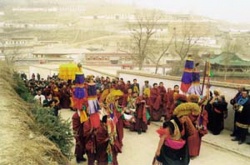My Personal Experience of the Democratic Reform
By QIME COMO
I was a house slave since my birth because I was born to a family of house slaves in a manor in Shannan Prefecture. By the Democratic Reform in 1959 I had worked in that manor for 13 years.
I have almost no impression of my father. I only remember that one snowy winter day my father was forced to go with some people and he never came back. Later my mother said he was forced to provide corvee in a remoter place by the serf owner. At the beginning, my father's family were not slaves, rather, his was a well-off family. But one day the serf owner said his family had owed a debt to the manor for a long time, and the interest rate of the usurious loan was frightening. His family could not repay it, plus taxes and corvee, and so soon his family had to sell their last livestock. To pay the debt, my grandfather was sent to the manor to work as a slave, and his descendants, as the inheritors of the debt, became slaves from generation to generation. In a manor, all slaves had owed debts to serf owners for generations.
After my father was gone, my mother waited and waited. Being grief-stricken and suffering from malnutrition, she became blind and could not do any work. When the manager of the manor remembered, he gave her a little food, and when he forgot, she had to endure hunger. The breakfast of a slave was a little zamba, a cup of tea, and a bit of butter. Supper was porridge made of qingke flour. People could not fill their own stomach, let alone giving out food to us. My mother and I often had nothing to eat for several days. I could not speak at the age of four. I had a big head and a small body, and was very short. Once, a fellow slave wanted to give us some leftover food, but was discovered by the serf owner. Both his hands were chopped off in public. Not long after that, my mother died. Her family had been house slaves for generations. She was born in a cow shed of the owner, and her mother was born in a stable. Slaves were not allowed to live in houses, they could only live in corridors, cow sheds or stables. Whatever the weather, no matter it was windy, raining or snowing, they were not allowed to deliver a baby in a room. Even the serf owner's dogs had their own kennels.
I was just seven years old when my mother died. The serf owner first ordered me to his child. When I was older, he assigned me to twist thread, graze cattle, and chop fodder. When I was assigned to herd cattle, I had to stay outdoor from morning to night, and not one livestock was allowed to be lost. One day, I came back earlier than usual because it was raining heavily and the manager of the manor beat me. I dreaded and hated him. But this wasn't the worst of it. Once, a child herder met a wolf, which took away a goat. Though he was fortunate enough not to be eaten by the wolf, he was beaten within an inch of his life, and his parents had to compensate the serf owner double the original price of the goat.
When I was 16 years old, I lost one finger when chopping fodder, and the wounded finger was bleeding hard. I fainted. Someone reported this accident to the manager and serf owner, but they did not care a bit. When I came to, the finger had been taken away by a dog. Without any medicine or bandages, my finger became septic. Another slave thought of a solution. He boiled some butter and put the wound into the boiling butter. I fainted immediately, but my hand was saved. The next day, the serf owner ordered me to graze cattle. I did, but I was filled with fury.
When I was 18 years old, I fell in love with another slave. Slaves of the same owner found it easier to get married, as long as they got permission from the serf owner, but slaves of different owners had to get the consent of different owners, and no one wanted to lose a slave through marriage. We did not get married, but we had a son, who died a few days after his birth.
When I was 20 years old, the Democratic Reform was carried out. I knew this term much later. I remember that one night the manor was in disorder and I heard footfalls and muffled voices. We were not allowed to hear and see, or we would be punished by the gorging out of our eyes or cutting off of our ears. The next morning, the manor was unusually quiet and the serf owner and manager disappeared. Someone passed a message from the serf owner saying that during the period when he was away no one was allowed to make trouble or speak to the Han people. He would come back very soon and if he found any violation of his rule he would deal with the culprits severely. We worked as usual, but felt the quietness dreadful, and dared not ask what had happened. Some bolder slaves went out and soon brought back surprising news: in some places the serfs were distributing the land of the serf owners.
A few days later, many Han people came to our village and entered the manor to talk with us. I had heard that the Han people were worse than the serf owners, so I fled as soon as I saw them. I thought if the serf owner knew I had talked to a Han, I would be killed. Later a Tibetan woman older than I talked to me and gave me food and clothes. At that time, I had not one complete garment, I had only a bag-like skirt with patches over patches which was covered with patches over patches which was covered with greasy dirt. Since my mother's death, no one had treated me as well as she did. Still I kept a wary eye on her. She worked together with us and talked with us every day. I remember that she said she came here to liberate us, and she would distribute the land and houses among us. What she said was just what I had dreamed of. I had always dreamed of owning a house of my own. But still, I only half-believed her.
A few days later, a grand meeting of all the slaves was held in the manor, attended by 200 slaves. We sat on an open land, and a Han person was speaking, with a Tibetan interpreter by his side. He said that the serf owner had fled and that we should elect a leader to lead a new life. He said both men and women could be elected, as long as they were fir and just in handling affairs. These people would be organized into a peasants' association which would organize us to carry out production. These words sounded queer to us. Could a woman be made a leader?
The list of candidates was prepared beforehand, all were slaves heavily oppressed by the serf owners and were young and capable. For the discussion we were divided in three groups. One group, consisting of farmers who rented land for planting and paid taxes to serf owners and handicraftsmen, discussed excitedly; the other two groups, consisting of serfs and house slaves, kept silent. Because we were humiliated and oppressed by serf owners and managers almost every day, sometimes we thought we were inferior to pigs and dogs. Could there be anyone who would listen to us? Finally, an old house slave said in a low voice, "Sir has spoken for us, and those who have been elected are the people we prayed for in our minds in morning and evening." At last, four males and four females were elected committee members. Seeing the committee members we had chosen, I felt happy beyond words.
The first thing the peasants' association did after its election was to denounce the manager of the manor at a public meeting. Hearing that the manager had been caught, the serfs were overjoyed. When a meeting was convened, people gathered spontaneously, there was no need to do any organizing work. At the meeting, people poured out their grievances and suffering. An old house slave rushed forward to the stage, wanting to beat the manager, but dare not do it. When a young lad kicked the manager, the elderly house slave gave the manager a punch. Tears streamed dowu his cheeks as he recounted how his daughter was raped by the manager and then starved to death with her hands and feet bounded. The manager was put under the supervision of the peasants' association to reform through labor.
Seeing the distorted face of the manager caused by terror, most of us felt we had become masters of our own affairs. Then the "Three Against and Two Reduction" Movement was launched (movement against rebellion, ula and slavery, and for the reduction of rent and interest charges). Under the leadership of the peasant associations of various villages, men held high red banners, colorful banners and scripture banners and beat drums, and women held wild flowers in their hands, we held a meeting in Zetang, capital of Shannan Prefecture. The sound of the drums and people shouting slogans was deafening. The contracts of usury loans owned by serf owners who participated in the rebellion were set on fire and turned to ashes. The land and livestock of the serf owners was distributed among the serfs, and I was assigned a room, which had belonged to the serf owner. Later I was sent to study at a university. All my dreams came true overnight.
But not every one was happy. The association had planned to persuade some middle peasants to give up parts of their land so that every one could get the same share of land, but the middle peasants felt they were treated high-handedly, and refused, and finally the middle peasants kept their land. Some serfs were reluctant to accept the land, fearing that they might be made to provide corvee, and some feared that the serf owners might come back and retaliate. The association did not force them to accept the land. Finally, they accepted their land on their own initiative.


